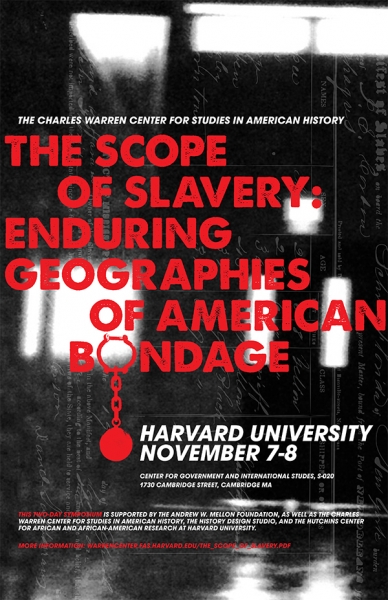Date:
Location:
The Scope of Slavery: Enduring Geographies of American Bondage
The Charles Warren Center for Studies in American History
What is the proper scope for analyses of slavery? Within the United States, the institution has been viewed as a distinctly regional phenomenon, with its primary locus in the Southern states. Scholars generally understand slavery as a historic phenomenon, transcended by the Age of Emancipation in the nineteenth century. And yet mass incarceration in the United States has increasingly been compared to slavery, with many emphasizing that the Thirteenth Amendment to the US Constitution made an exception for convicts. The conflation of slavery and incarceration raises important questions about the spatial and temporal parameters of American bondage.
Examining the long duration of America’s carceral geography, we will consider continuities and discontinuities that frame slavery and emancipation, race and mass incarceration, extraterritorial internment, speculative condemnation, and the political mobilizations and strategies for redress pursued by confined populations and their advocates.
This two-day symposium is supported by the Andrew W. Mellon Foundation, as well as the Charles Warren Center for Studies in American History, the History Design Studio, and the Hutchins Center for African and African-American Research at Harvard University.
FRIDAY, NOVEMBER 7, 2014
Opening Remarks, 10:15-10:30am: Vincent Brown (Harvard University)
Opening Keynote, 10:30-12:00pm: Ruth Wilson Gilmore (City University of New York)
Introduction: Walter Johnson (Harvard University)
Lunch, 12-1:30pm
Panel 1: Carceral Landscapes of Slavery and Emancipation, 1:30-3pm
Tommie Shelby (Harvard University), Chair and Moderator
Taja-Nia Henderson (Rutgers University, Newark) “Slaving in the Antebellum Prison”
Rebecca McClennan (University of California, Berkeley): TBA
Diana Paton (Newcastle University): “‘Punishment after Slavery: Jamaica and the United States in Comparative Perspective”
Break, 3-3:30pm
Panel 2: Mobilization and Redress, 3:30-5pm
Armin Fardis (Harvard University), Chair and Moderator
Susan E. O’Donovan (University of Memphis): “Citizens of the World: Globe-trotting Slaves in the Age of Secession”
Toussaint Losier (University of Massachusetts-Amherst): "...Like a Plantation Slave Thing": Prisoner Rebellions, Cell Block Discipline, and the Origins of Mass Incarceration in Illinois
Heather Ann Thompson (Temple University): “Fighting UnFreedom: Legacies and Lessons from Attica"
SATURDAY, NOVEMBER 8, 2014
Panel 3: Race and Mass Incarceration, 9:30-11:00am
Lisa McGirr (Harvard University), Chair and Moderator
Elizabeth Hinton (Harvard University):"A 'Long Range Master Plan:' Envisioning Mass Incarceration in the 1970s”
Max Mishler (New York University): "The Strange Career of Mass Incarceration: Liberal Freedom, Criminal Law, and the Black Convict"
Khalil Muhammad (Schomburg Center for Research in Black Culture): TBA
Break, 11-11:30am
Panel 4: Sentencing by Speculation, 11:30am-1pm
Lawrence Bobo (Harvard University) Chair and Moderator
Anthony Farley (James and Mary Lassiter Endowed Distinguished Visiting Professor University of Kentucky College of Law):“Wave of Mutilation: The Prison as the Middle Passage”
Gustav Peebles (The New School for Social Research):“Money and the Body in 19th Century Reform Movements”
Michael Ralph (New York University):“The Actuarial Logic of Slavery”
Lunch, 1-2pm
Panel 5: Carceral Empire, 2-3:30pm
Kerry Chance (DuBois Institute, Harvard University)
Laleh Khalili (School of Oriental and African Studies): “Lineaments of Settler-colonialism in Counterinsurgency Confinement”
Jana Lipman (Tulane University): “’The camps are...little better than prisons’ Refugee Camps and Detention in the U.S. Imperial Archipelago”
Benjamin Weber (Harvard University): "The Highway to Empire: Sovereignty and Servitude in the Panama Canal Zone, 1904-1944"
Break, 3:30-4pm
Closing Keynote, 4-5:30pm: Colin Dayan (Vanderbilt University): “Up against the law, or the impossible color of separation”
Introduction: Glenda Carpio (Harvard University)

